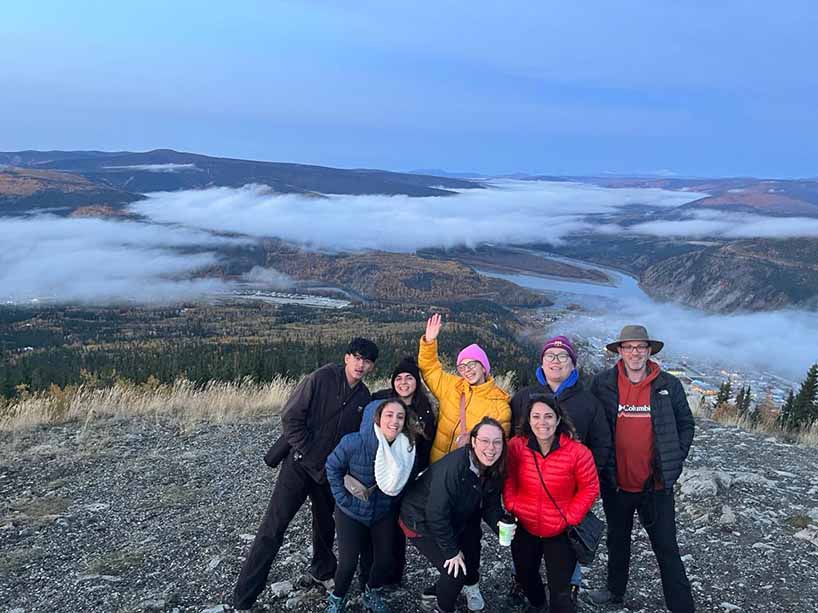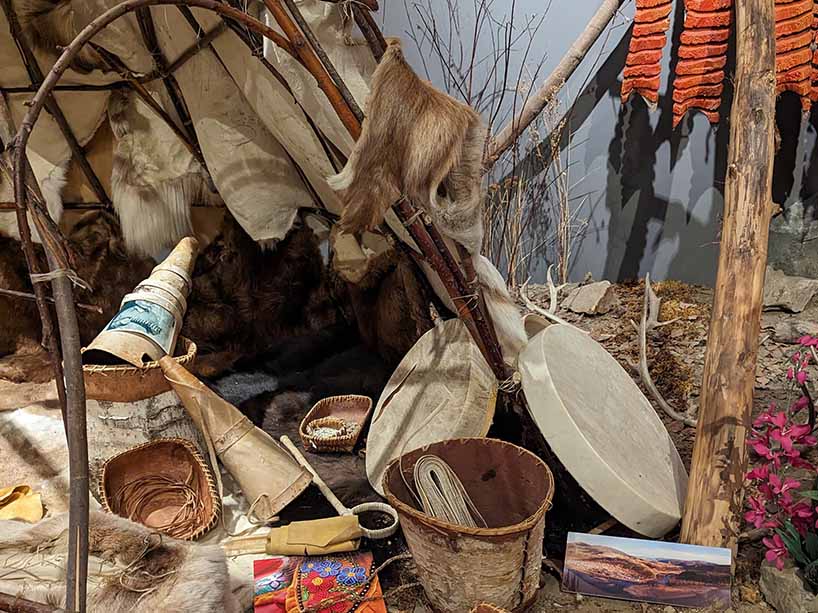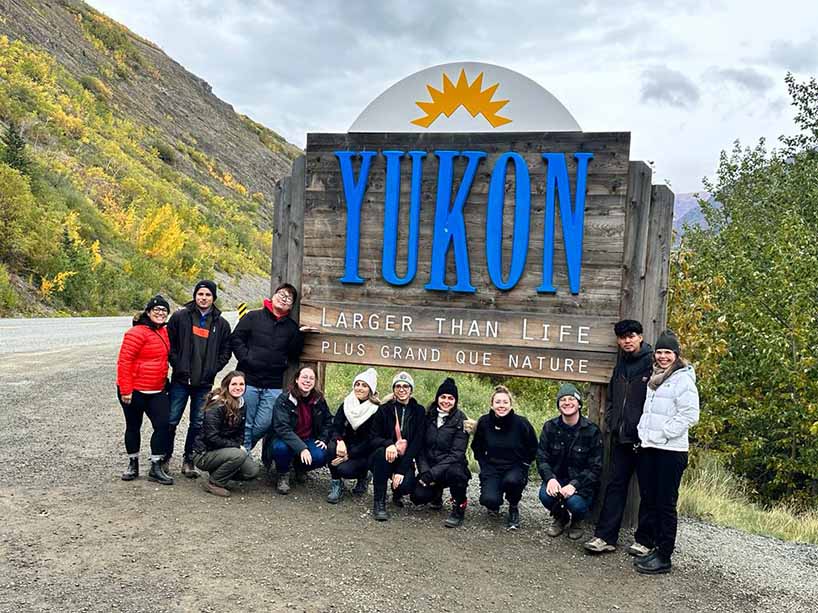Experiential learning inspires the next generation of tourism trailblazers

Students at the Midnight Dome, overlooking Dawson City, Klondike Valley and the Yukon River. Photo: Sonya Graci
How often do we consider the impact of our travels on local communities and the potential learning opportunities offered? Experiential learning is a valuable way to deepen our understanding of complex social and environmental issues, while strengthening critical thinking and leadership skills.
Earlier this fall, a group of students from Toronto Metropolitan University (TMU)’s Hospitality and Tourism Management program travelled to the Yukon and Northwest Territories to gain an experiential understanding of how tourism can contribute to sustainable livelihoods. The journey encouraged students to connect their studies and skills to people, events and issues in local communities and to understand challenges as a way to develop their own careers.
The 10 students from HTT800 Field Studies in Hospitality and Tourism joined Sonya Graci, professor and director of the Institute for Hospitality and Tourism Research, on a journey to northwestern Canada to learn from local leaders about Indigenous issues, policies and ways of life in Canada’s north. The trip provided students with an authentic Arctic experience and insight into the daily life of Indigenous peoples as they examined issues related to reconciliation, climate change, food security and sustainable livelihoods.
Starting in Whitehorse, the students visited Copper Caribou to view handcrafted art and jewelry made by local artists and participated in a hide-tanning workshop. They then visited Long Ago Peoples Place, a recreation of a traditional First Nations Village, where they took part in a medicine walk and made their own salve.
Journeying on to Dawson City, the group visited the Indigenous Cultural Centre and took a tour around the Yukon River with an Indigenous guide, who introduced them to its significance and history. They then enjoyed an outing with Parks Canada where they learned about the gold rush and its impact on the community.

At the cultural center in Dawson City students viewed hides and a few of the tools used in the process of hide tanning. Photo: Kaitlyn Washbrook
Leaving the Yukon, the students took the Dempster Highway to the more remote locations of Inuvik and Tuktoyaktuk in the Northwest Territories, where they saw first hand the challenges many communities are facing with food insecurity and climate change. For example, ice conditions are shifting and longer ice-free seasons are becoming the norm and species of animals and fish are moving further north. The students stayed in the Okpik Arctic Village and learned about traditional hunting, trapping and fishing. They also met with Elders and heard stories about life in the Delta.
“This trip was really eye-opening,” said fourth-year student Sidra Almwisati. “Within one country there are people experiencing such different things. Tourism can really benefit a place but we need more education about how to do it in a sustainable way.”
Through experiential learning, the students gained appreciation for the potential tourism has to contribute to sustainable livelihoods, capacity building, Indigenous resurgence and reconciliation. By meeting with and listening to Indigenous people from a range of ages, with different experiences, the students were given a first-hand view into many of the challenges that exist in these regions.
“It’s important to understand what life is like for the people in the Arctic,” says Graci. “The communities we visited are dealing with real challenges. These students will be able to advocate for authenticity in tourism and how life-changing travel can be.”
With conscientious planning, tourism development can support job growth and lead to improvements to infrastructure and services in the destination location. This can mean everything from investing in renewable energy, water conservation, waste management and transportation to ensuring equitable socio-economic outcomes and poverty reduction through stable employment and income-earning opportunities.
The journey presented students with a chance to reflect critically on assumptions they may have had coming into the course, and to validate their studies with new knowledge and experiences. While travelling, the students actively engaged in responsible tourism by promoting and supporting local culture. Responsible tourism includes actively appreciating the cultural authenticity of destination communities, to respect and protect the cultural heritage and traditional values of host communities and contribute to intercultural understanding.
“I am thrilled that the president’s and provost’s offices were able to support an incredible, once-in-a-lifetime experience for these students,” said Provost and Vice-President, Academic, Roberta Iannacito-Provenzano. “Experiential learning opportunities like this are extremely valuable. Each of these students is now empowered to use the knowledge they gained to enhance their career development and ongoing education.”

Students joined Professor and Director of the Institute for Hospitality and Tourism Research, Sonya Graci, to meet with local communities and tourism leaders in the Yukon and Northwest Territories. Photo: Sonya Graci
Students may use this learning experience to launch their careers, embarking on transformational tourism to grow into their own new ways of being and engaging with the world, while contributing to the overall good of local communities. In this way, the connections forged through experiential learning can help to create strong community stewards who bring their skills and experiences to finding solutions to difficult challenges.
For Sidra Almwisati, the journey was life-changing. “I can’t help but reflect on the profound impact this trip had on me. I am filled with deeper understanding and empathy.” Following her return from the northwest, Almwisati plans to pursue work in destination management, to apply sustainable tourism principles to creating immersive experiences for travelers, while growing the competitiveness and sustainability of destinations. “I know now that I'd like to be a part of what destinations are trying to achieve.”
